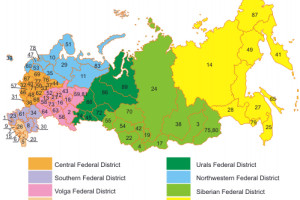All Russia’s Systemic Parties and Most Opposition Ones Remain Moscow-Centric, Federative Party Head Says

(Paul Goble – Window On Eurasia – Staunton, May 7, 2021)
All four of Russia’s systemic parties are Moscow-centric and approach the regions in an abstract way that is only about how to benefit themselves and the capital, and most of the country’s opposition parties are equally Moscow-centric, concerned only about replacing what they see as a bad tsar with a good one, Oleg Khomutinnikov says.
The historian who serves as a deputy in the Lipetsk Oblast council founded the as-yet unregistered Federative Party to try to overcome such attitudes out of a belief that the free development of regions not only will boost economic development but provide the basis for democracy and freedom for the country as a whole.
(For background on his uphill fight given the Russian government’s ban on regional parties and Moscow’s conviction that any regional activism will lead to the disintegration of the country, see windowoneurasia2.blogspot.com/2021/02/federative-party-absurdly-being-accused.html and windowoneurasia2.blogspot.com/2021/05/regional-amalgamation-call-completely.html).
Khomutinnikov has now given an interview to Vadim Shtepa, the editor of the Tallinn-based Region.Expert portal, for Radio Liberty in which he develops these ideas and stresses that regionalism and federalism are necessary preconditions for a free, democratic and prosperous Russia in the future (svoboda.org/a/31241452.html).
None of the Duma parties want to take note of the growing demand for improving life in the regions and the desire of people there to have greater control over their lives instead of simply being dictated to by Moscow and Moscow appointees, the Federative Party head continues.
One of the reasons both the systemic and extra-systemic parties fail to pay attention to regional aspirations, he says, is that the regions and republics have been stripped of the rights the constitution says they are supposed to have that neither the one nor the other kind of party conceives of the need for federalism both politically and economically.
But “as long as this de facto division of the country into ‘a metropolitan center’ and ‘colonies’ is preserved, no improvement in the lives of the majority of residents of the regions will take place.” Consequently, the activist says, his party seeks “a change of the structural foundations of the state, not just the replacement of a ‘bad’ Kremlin ruler with a ‘good’ one.”
That puts it at odds with jailed opposition leader Aleksey Navalny, Khomutinnikov says, given that despite all his good anti-corruption work, he remains “too centrist,” a reflection “perhaps” of his being a resident of the capital. But Moscow isn’t Russia, and Russia is too diverse to develop as if it were.
Russia is on paper an asymmetric federation, something many in Moscow think is both wrong and unsustainable. But experience shows that “asymmetry does not preclude a federation.” What blocks it in Russia is that “the Kremlin powers in principle do not want to create a federation.”
After a brief period in the early 1990s, they led the charge to “a new centralization and the creation of ‘the power vertical,’ even though this term appeared later. But a federation is about horizontal and equal ties and the mutuality of connections among the regions.” And that is the basis for the stability of the country.
Today, because of Moscow’s policies, “the regions are in fact isolated from one another. Each of them is tied exclusively to the center, and all inter-regional projects must be agreed to with some ‘central’ officials.” As a result, most of them are blocked or only superficial in their impact.
The Moscow-centric parties approach the regions in an “abstract” way, as the continuing calls for amalgamation show, something that reflects just how long those in power or aspiring to power have been around. They cannot imagine change and thus see anyone who calls for change as a threat rather than as a potential ally.
And the Muscovites if one may call them that fear regions and republics because they fear the freedoms that the people in these places want. They “don’t want to share power and want to preserve it forever. This is a generalized portrait of the those in the metropolitan center who call themselves the Russian elite.”
[article also appeared at windowoneurasia2.blogspot.com/2021/05/all-russias-systemic-parties-and-most.html]
